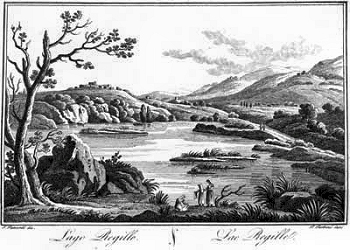
Foedus Cassianum
Encyclopedia
According to Roman tradition, the Foedus Cassianum, or the Treaty of Cassius, was a treaty
which formed an alliance between the Roman Republic
and the Latin League
in 493 BC after the Battle of Lake Regillus
. It ended the war between the Latin League and Rome, placing Rome as equal in power to all of the members of the League combined.
 In their first treaty with Carthage, the Romans listed the surrounding countryside as part of its territory, which the Latin League contested, claiming that the said territory actually belonged to them. A war followed, with the result of a victory for the Romans at the Battle of Lake Regillus and conditional surrender soon after. The treaty, the first foedus ever signed by Rome, sealed this surrender. The treaty was concluded in 493 between Rome and thirty Latin cities as two independent powers. The foedus
In their first treaty with Carthage, the Romans listed the surrounding countryside as part of its territory, which the Latin League contested, claiming that the said territory actually belonged to them. A war followed, with the result of a victory for the Romans at the Battle of Lake Regillus and conditional surrender soon after. The treaty, the first foedus ever signed by Rome, sealed this surrender. The treaty was concluded in 493 between Rome and thirty Latin cities as two independent powers. The foedus
took its name from Spurius Cassius Viscellinus, who was a consul
of the Roman Republic at the time the treaty was signed, and who is alleged to have negotiated the terms.
and Latin
armies would be joined to provide mutual defence from Italic tribes. Another term was that the Latin League and Rome would split all spoils taken in war. Also, the two parties agreed to set up joint colonies in captured territory so that they both might prosper. Finally, it established a community of private rights between citizens of Rome and any Latin city. The treaty, of which a bronze copy survived in the Roman Forum till Cicero
's day, was a landmark in the early history of Rome. The original does not survive. A version given by Dionysius of Halicarnassus
is
Dionysius' version mentions a mutual defense pact between the Romans and Latins, but omits any mention of a joint command structure or any provision for mutual consultation. A few fragmentary sentences from L. Cincius (as quoted by Festus) indicated that the Latins would meet at the spring of Ferentina
to discuss the issue of command. In addition, he describes the process followed "in a year when it was the responsibility of the Romans to supply a commander for the army by order of the Latin name". The passage is somewhat vague, and seems to imply that command of the army would alternate in years between the Latins and the Romans. However, this appears to have never occurred, and so the most probable explanation is that a Roman commander was summoned only in years when a campaign actually took place.
. The treaty was renewed in 358 BC
. However, Rome reneged on the treaty soon after that, and the Latin War
began. Rome eventually overcame the non-Roman members of the league, and the Foedus Cassianum was rendered void.
Treaty
A treaty is an express agreement under international law entered into by actors in international law, namely sovereign states and international organizations. A treaty may also be known as an agreement, protocol, covenant, convention or exchange of letters, among other terms...
which formed an alliance between the Roman Republic
Roman Republic
The Roman Republic was the period of the ancient Roman civilization where the government operated as a republic. It began with the overthrow of the Roman monarchy, traditionally dated around 508 BC, and its replacement by a government headed by two consuls, elected annually by the citizens and...
and the Latin League
Latin league
The Latin League was a confederation of about 30 villages and tribes in the region of Latium near ancient Rome, organized for mutual defense...
in 493 BC after the Battle of Lake Regillus
Battle of Lake Regillus
The Battle of Lake Regillus was a legendary early Roman victory, won over the Latin League led by the expelled Etruscan former king of Rome. It is usually said to have occurred in 498 BC, but other dates have been proposed, including 499 BC, 496 BC and 493 BC.The battle may be entirely legendary,...
. It ended the war between the Latin League and Rome, placing Rome as equal in power to all of the members of the League combined.
Background

Foederati
Foederatus is a Latin term whose definition and usage drifted in the time between the early Roman Republic and the end of the Western Roman Empire...
took its name from Spurius Cassius Viscellinus, who was a consul
Consul
Consul was the highest elected office of the Roman Republic and an appointive office under the Empire. The title was also used in other city states and also revived in modern states, notably in the First French Republic...
of the Roman Republic at the time the treaty was signed, and who is alleged to have negotiated the terms.
Terms
The treaty laid out several terms. Not only did it stipulate that there would be peace between the two parties, the treaty mandated that the RomanRoman army
The Roman army is the generic term for the terrestrial armed forces deployed by the kingdom of Rome , the Roman Republic , the Roman Empire and its successor, the Byzantine empire...
and Latin
Latins
"Latins" refers to different groups of people and the meaning of the word changes for where and when it is used.The original Latins were an Italian tribe inhabiting central and south-central Italy. Through conquest by their most populous city-state, Rome, the original Latins culturally "Romanized"...
armies would be joined to provide mutual defence from Italic tribes. Another term was that the Latin League and Rome would split all spoils taken in war. Also, the two parties agreed to set up joint colonies in captured territory so that they both might prosper. Finally, it established a community of private rights between citizens of Rome and any Latin city. The treaty, of which a bronze copy survived in the Roman Forum till Cicero
Cicero
Marcus Tullius Cicero , was a Roman philosopher, statesman, lawyer, political theorist, and Roman constitutionalist. He came from a wealthy municipal family of the equestrian order, and is widely considered one of Rome's greatest orators and prose stylists.He introduced the Romans to the chief...
's day, was a landmark in the early history of Rome. The original does not survive. A version given by Dionysius of Halicarnassus
Dionysius of Halicarnassus
Dionysius of Halicarnassus was a Greek historian and teacher of rhetoric, who flourished during the reign of Caesar Augustus. His literary style was Attistic — imitating Classical Attic Greek in its prime.-Life:...
is
- "Let there be peace among the Romans and all the Latin cities as long as the heavens and the earth shall remain where they are. Let them neither make war upon one another themselves,nor bring in foreign enemies nor grant a safe passage to those who shall make war upon either. Let them assist one another when warred upon, with all their forces, and let each have an equal share of the spoils and booty taken in their common wars. Let suits relating to private contracts be determined within ten days, and in the nation where the contract was made. And let it not be permitted to add anything to, or take anything away from these treaties except by consent both of the Romans and of all the Latins"
Dionysius' version mentions a mutual defense pact between the Romans and Latins, but omits any mention of a joint command structure or any provision for mutual consultation. A few fragmentary sentences from L. Cincius (as quoted by Festus) indicated that the Latins would meet at the spring of Ferentina
Ferentina
Ferentina was the patron goddess of the city Ferentinum, Latium. She was protector of the Latin commonwealth. She was also closely associated with the Roman Empire....
to discuss the issue of command. In addition, he describes the process followed "in a year when it was the responsibility of the Romans to supply a commander for the army by order of the Latin name". The passage is somewhat vague, and seems to imply that command of the army would alternate in years between the Latins and the Romans. However, this appears to have never occurred, and so the most probable explanation is that a Roman commander was summoned only in years when a campaign actually took place.
Effects
The treaty strengthened Rome greatly, as it essentially added the military power of the Latins to the army of the fledgling Roman Republic. This allowed Rome to expand further, conquering much of the Italian PeninsulaItalian Peninsula
The Italian Peninsula or Apennine Peninsula is one of the three large peninsulas of Southern Europe , spanning from the Po Valley in the north to the central Mediterranean Sea in the south. The peninsula's shape gives it the nickname Lo Stivale...
. The treaty was renewed in 358 BC
358 BC
Year 358 BC was a year of the pre-Julian Roman calendar. At the time, it was known as the Year of the Consulship of Ambustus and Proculus...
. However, Rome reneged on the treaty soon after that, and the Latin War
Latin War
The Latin War was a conflict between the Roman Republic and its neighbors the Latin peoples of ancient Italy. It ended in the dissolution of the Latin League, and incorporation of its territory into the Roman sphere of influence, with the Latins gaining partial rights and varying levels of...
began. Rome eventually overcame the non-Roman members of the league, and the Foedus Cassianum was rendered void.
External links
- Conquest of Italy: The Consolidation of Latium United Nations of Roma Victrix unvr.com
- Roman Timeline 5th Century BC United Nations of Roma Victrix unvr.com
- The Early Roman Republic Roman-Empire.net
- Foedu Cassianum Leggenda Del Circeo www.circei.it
- foedus Encyclopedia Britannica Online
- The Early Republic The Encyclopedia of World History. 2001

